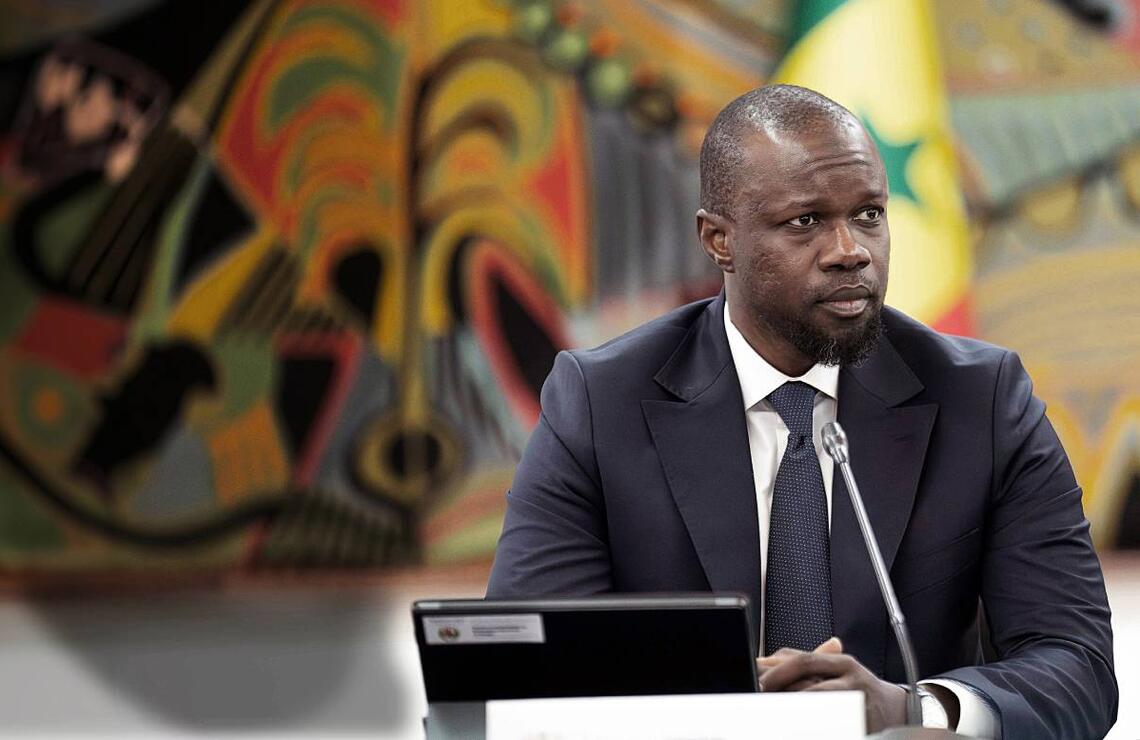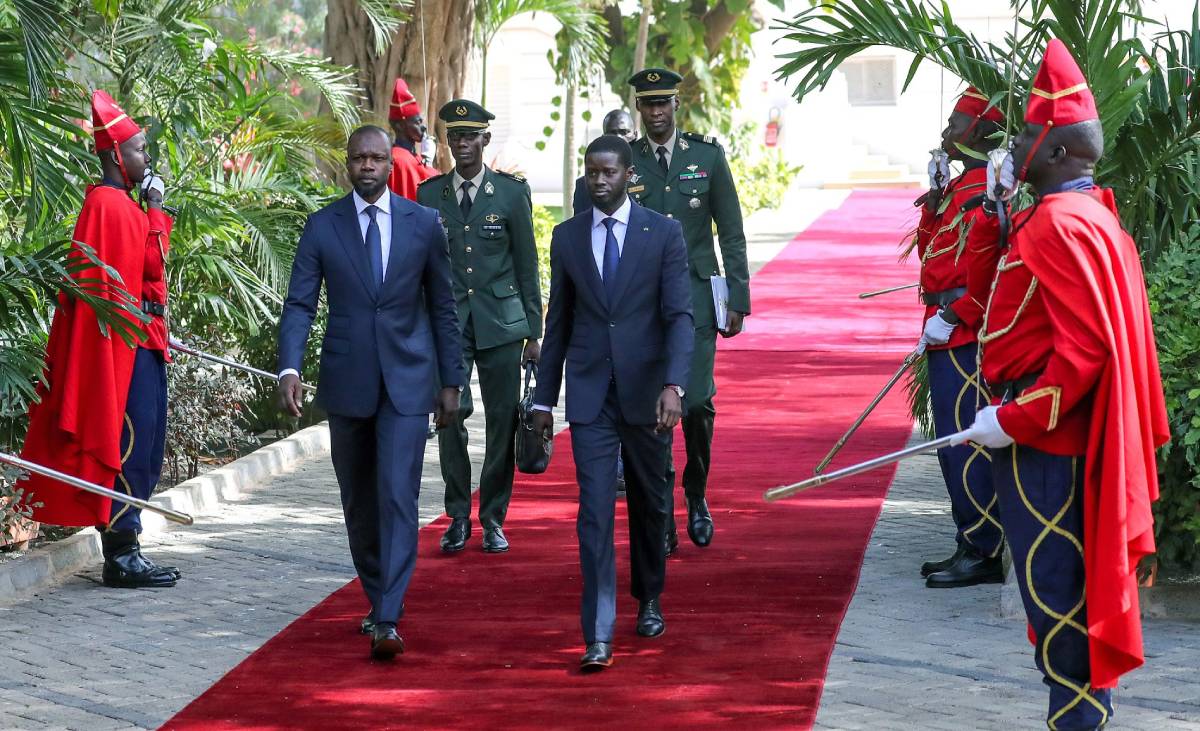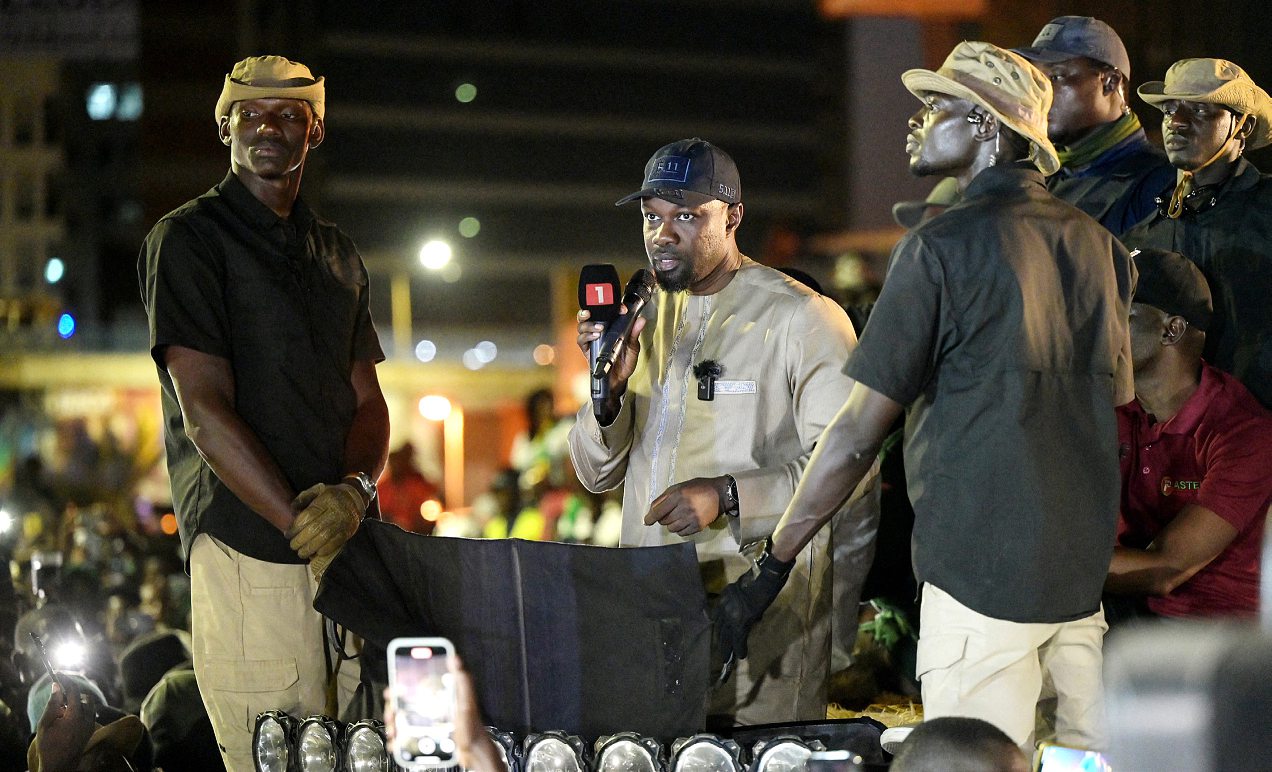
Senegal
The Sonko enigma
He is Prime Minister, but not President. Yet he is undeniably at the centre of the revolution currently underway, the echoes of which go far beyond the country's borders. At once a sovereignist and a pan-Africanist, conservative and pragmatic, impulsive and a good listener, he is above all the bearer of hope for change for a large part of the population... Here follows a five-point attempt at portraying the enigma that is Ousman Sonko.

Part I. The 24 March 2024 presidential election gave the first indication of the groundswell of support. It was won in the first round by Bassirou Diomaye Faye, who had been released from prison a few days earlier, with 54% of the vote. He was nominated and endorsed by his mentor Ousmane Sonko, who had also been released almost on the eve of the election but was ineligible. It was an undisputed victory, ending over a decade of Macky Sall's rule (2012-2024), a spectacular changeover, and the symbol of the desire for a profound, multi-dimensional, generational, social, societal and political break with the past. The rejection of the model of emergence and ‘liberal’ governance, which would have benefited only certain ‘ elite’. Senegal shook things up. Taking the institutional route of voting, thereby avoiding a violent changeover or the mirage and impasse of a coup d'état. And by bringing young opponents, many of them from modest backgrounds and part of the local meritocracy, to the leadership of the nation.
Part II. Bassirou Diomaye Faye moved into the presidential palace. And Ousmane Sonko became his Prime Minister. The National Assembly embodied the new opposition, with a relative majority from the previous regime. Eight months went by, often difficult in economic, social and political terms. With a complex ‘regime handover’. The task was to succeed Macky Sall's strong presidency. Bringing together a country that has been torn apart in recent months. Putting new teams in place. Keeping the Senegalese ship afloat, understanding the mechanisms of government, fulfilling campaign promises, taking account of macroeconomic balances and imbalances. Fits and starts been frequent. Untimely and sometimes counter-productive statements, particularly on the financial front, a latent war with the national press, tense relations with those who disagree... The new government is also conducting a campaign of audits, hunting down ‘corrupt contracts’, which is alarming the business world. And business has largely ground to a halt. The state has run dry, paying little or badly. Relations with the IMF are strained and on the verge of breaking down. The so-called ‘project’ for the country's economic and social transformation was announced in October. It seemed ambitious, bearing in mind that in the more or less hushed world of international financial institutions, it was hard to see how all this could be financed without introducing fundamental reforms (which would also be unmanageable from a social point of view, such as ending subsidies).
The break with Macky Sall is brutal. Living in exile, the former president travels the world. His ‘trial’, and that of those close to him and some of his ministers, is conducted daily in the public arena, on the theme of widespread misappropriation of funds and illicit enrichment. The achievements, some of which are very real, are being written off. The former president wants to remain in politics, at the head of his party, and is seeking to rally his troops. The almost benevolent images of March 2024, during the handover of power, have already faded.
We are watching this new power take hold, this surprising and rather unique executive ‘duo’ embodied by Prime Minister Ousmane Sonko and President Bassirou Diomaye Faye. These two leaders have a shared history, having embarked on a veritable odyssey together, that of the creation and rise to power of PASTEF (Patriotes africains du Sénégal pour le travail, l'éthique et la fraternité). They are like two sides of the same coin. Like brothers sworn to loyalty. They have traditional Serer and Diola codes. Diomaye even has a son called Ousmane. But plan A was obviously Ousmane Sonko, the party's founder and herald of its activists, who has been on the front line since 2016. He had already stood for election in 2019 (where he scored just over 15%). A man who has fought Macky Sall head-on. His multiple arrests and detentions, particularly following a disturbing case of rape, led to riots, repression and victims. It was Ousmane Sonko who decided to encourage Diomaye Faye's alternative presidential candidacy in order to ‘protect the project’. It is Sonko, surprisingly freed by Macky Sall, who will electrify the campaign. He is the leader. But he is not the president.
Tensions are bound to run high between the two men. Diomaye reassured everyone that he had a wide constitutional remit, as this is a presidential system. He is the embodiment of sovereignty, and it was he who announced the gradual withdrawal of French troops from Senegal. It is he who presided over the ceremonies to mark the 80th anniversary of the Thiaroye military camp massacre, and it is he who travelled and met his fellow heads of state. The President ‘speaks’ to the traditional elites, who see in him a possible counterweight to Sonko, the impetuous, the popular, the embodiment of a Senegal keen to break with the past. The balance between the two heads of state is subtle. Ambition and entourages play their part, as do differences in background and temperament. But Ousmane Sonko remains the political centre of gravity, the hyper-Prime Minister endorsed by the people through the legislative election. As we have said, this is a truly unprecedented situation. There is sometimes talk of heated debates and raised voices. But they make up quickly. One visits the other, and vice versa, to clear up the initial dispute and move on... The adventures of this ‘duo’ have only just begun. They need each other. For the time being.
Part III. November. The duo began dissolving the National Assembly following the deadline imposed by the constitution. The country started campaigning for the legislative elections. Ousmane Sonko surveyed the country. He knew what he had to do. He appealed to his supporters and voters to finance the operation. Small donations poured in, which was a sign... PASTEF went it alone, with no alliance, confident of its momentum. However, the opposition felt it had a chance. That there might be a way of destabilising the new government. That it was possible to get enough MPs to carry weight. And to protect themselves too. Some voters were said to have been discouraged by the results of the last few months. Macky Sall headed a list, campaigning from afar, and the opposition advanced in a disorganised fashion. The miscalculation was obvious and the results were clear. PASTEF stormed to victory. With 55% of the vote and 130 of the 165 seats. The leading opposition figures were even beaten at home, in their constituencies.

Part IV. The presidential election was Bassirou Diomaye Faye's moment. The legislative elections were Ousmane Sonko's moment and victory. Of course, as is always the case in Senegal, the legislative elections confirm the presidential election. And, as is often the case, they have a comfortable majority, with the notable exception of those resulting from the 2022 elections. But this time, the meaning seemed very different. This is no longer a predictable transition between historic and traditional parties. What we saw was a break with the past. Almost the entire political class was swept aside - socialists, liberals, the heirs of Abdoulaye Wade, post-Macky players, Amadou Ba, Barthelemy Dias... Just over ten years after its formation, PASTEF has established itself at the centre of the political scene, and Ousmane Sonko at the heart of power. With its super-majority, the party has all the resources it needs to implement its famous ‘project’, the economic, social and institutional revolution so long awaited by the Senegalese people. Virtually a new republic. On the political front, the mother of all reforms would be to promote a more decentralised, more institutional approach to power, one that emancipates itself from hyper-presidentialism, from the notion that one man or woman can be the centre of everything. Certain consultative institutions that consume large sums of money will be in the firing line, such as the Economic, Social and Environmental Council (CESE) and the High Council of Local Authorities (HCCT). There is also talk of the repeal of the amnesty law, passed in the very last days of Macky Sall's term of office, which exempts from prosecution all those involved in demonstrations and their repression between February 2021 and 2024. And above all, the establishment of the High Court of Justice. This institution will be responsible for judging ministers and officials who have managed public funds and who are currently implicated in various scandals or accused of bad governance.
Obviously, local and international observers are trying to get a clearer picture of the character. To define ‘Sonkoism’ – the movement sweeping across a fragile and expectant society. Taking with it the deprived youth of the suburbs and housing estates, the children of the demographic dividend, the rural exodus, the failed school systems, students with no prospects or employment opportunities. But also wage earners, the urban and rural petty bourgeoisie deprived of opportunities, and executives seduced by the promise of a new model (and others by pure opportunism, practising transhumance with a certain skill).
AN AMBIVALENT AND ELUSIVE FIGURE
The PASTEF leader subscribes to a certain neo-Marxist, alter-globalist left, in search of new heroes (and orphaned since the death of Thomas Sankara). At the same time, he positions himself as an uncompromising conservative on traditional values. He is a practising Muslim and a polygamist (with two wives). In March 2022, he declared that he wanted to toughen the law criminalising homosexuality (currently punishable by between one and five years' imprisonment) “in the interests of preserving humanity”. A tax inspector and former executive at the Ministry of Finance, he has no particular affinity with the entrepreneurial spirit. He calls himself a sovereignist, a patriot and a pan-Africanist. Yet he appears to be pragmatic, even on issues that were central to the presidential campaign, such as the possible abandonment of the CFA franc and the reform or dismantling of ECOWAS. He hasn't travelled much, he doesn't know the world well because of his culture, he's not fascinated by the West, he runs hot and cold in his relations with France, and he has taken up the cause of the Thiaroye military massacre. 'Replacing one lot of politicians with another' is not something that Sonko is interested in, but rather ‘remaining free and dignified’. But the system is adapting and is being offset by President Diomaye Faye's intense diplomatic activity, as he keeps the traditional channels open, while announcing a possible visit to Moscow.
Basically, it's about the quantum leap from opponent and crowd mobiliser to head of a government, a state, a team of ministers and decision-makers. Ousmane Sonko is still learning, still in training. And today's deeds and words carry far more weight than those of yesterday... As someone close to PASTEF points out, ‘the conquest of power and the exercise of power are very different things’.
According to another well-informed observer of the Senegalese scene, we must first and foremost understand what Ousmane Sonko is all about. “What he says isn't coming from him. It's being said by the vast majority of Senegal. He acts as a megaphone. He embodies a powerful demand for change, for a societal break with the past. The end of a model, the end of a system that favours the elites and inequalities, that neglects the little people, the common people and the young. Sonko is also the embodiment of the importance and the necessity of accountability. He knows that this is expected. And he believes both ideologically and strategically that this is the way to go.” Our observer added: “If we overlook PASTEF and Ousmane Sonko, if we obstruct him in any way, that's when violence can occur, when the revolution can turn ugly, when crowds can explode, when a coup d'état becomes a possibility. Sonko channels anger and demand. He promises a solution. As a result, he is stabilising the country. And in that sense, his success is in everyone's interest.”
Be that as it may, Ousmane Sonko is determined to take action. The fight will be fought at the heart of the executive. Not on a folding chair or, conversely, on a distant mountaintop. Certainly, he centralises far too much, with most of his issues going back to the Prime Minister's office. As mentioned before, he can be impulsive and impetuous. He doesn't like people stepping on his toes, so he reacts. But he also listens. He seeks to rectify mistakes,' says someone close to him. And PASTEF's political culture involves dialogue and discussions between the leaders, which can, it is said, be quite lively. During the campaign, Sonko raged against the troops of Barthelemy Dias, mayor of Dakar and a former ally, accused of (proven) violence and verbal abuse. “Let every assault suffered by PASTEF at their hands since the start of the campaign, let every patriot they have assaulted and injured be proportionately avenged. We will exercise our legitimate right to retaliate”, he wrote on Facebook on the night of 11 to 12 November. “Barthelemy Dias and his coalition must no longer campaign in this country,” he added. The following morning, following intense internal debate, Sonko finally called on his supporters to “continue campaigning calmly and peacefully for the remaining days.” “The PM knows what he wants,” added one of our witnesses. “He wants to move forward, he clearly wants to assert his authority. But he is listening. And you have to engage him, open up the discussion with him.”
Part V. The country is also emerging from a long and highly politicised electoral sequence, in which the troops had to be mobilised. A page is being turned, and a new phase is beginning, which will certainly involve some form of normalisation, as well as a confrontation with reality, namely the country's economic and social situation. As one investor points out, ‘’rewriting the record cannot serve as an economic policy ad vitam aeternam. We need to restart the machine, restore confidence in the system, and re-engage with our main local and international partners’. The challenge is enormous. Senegal is still classified as a poor country, with a GDP of nearly 30 billion dollars, ranking around 20th on the continent. A country in a social emergency. The median age is nineteen. And 70% of Senegalese people are under thirty. Every year, over 200,000 young graduates enter the job market. Many of them want a job, a place to live or to get married. Others, in desperation, set off in dug-out canoes, risking their lives. By 2050, the population is expected to double to over 50 million. The PASTEF ‘project’ has an attractive philosophy. That of emancipation through the transformation of production methods. By integrating value chains. By creating local wealth. Through industrialisation. The strategy is not to fall into the trap of a cleverly engineered continuity (that of a skilful takeover of the former Environmental and Social Action Plans or ESAP). But how can the ‘project’ succeed without outside support, without the contribution of capital and expertise? How can the country be more than just a producer of raw materials? How can it start processing its fisheries and mining production, rebalance the revenues from gas and oil production, and embark on an ambitious policy of phosphate production and processing? How should import-substitution policies be promoted? The project also aims to significantly reduce foreign debt and double average per capita income in five years. In the same timeframe, to move out of the low human development zone and into the medium development zone. All of this, however, requires coherence and stability. And as all men and women in power know, there is the short term and the medium term, there is the need for growth to finance the social sector, there is the need for financing for the State and businesses...
MAKING HISTORY IN DAKAR
Senegal has many assets: talent, intelligence, democracy, a long coastline and natural resources. Its success depends on calming the political climate and ending the constant, pointless bickering. Success requires attracting real talent, creative people, technical experts, mobilising forces, fostering growth, confidence and investment. Success means being bold, skilful, seductive, realistic and pragmatic all at the same time.
A balancing act. Basically, something avant-garde and historic is happening in Dakar. This need for systemic change, the enduring inequalities, their rejection, the furious desire of young people to live and to be emancipated, speaks to almost the whole of Africa. This is a transition from one era to another, from one generational line to another, a search for what could be another system, a new chapter in the very long history of decolonisation and the construction of modern Africa. Changing the world, changing Senegal, will not happen overnight. But whether we agree or disagree ideologically, it is in the interests of the country that Ousmane Sonko and Bassirou Diomaye Faye do not stumble along any stretch of this path.